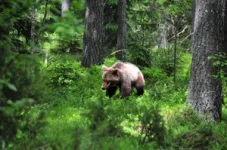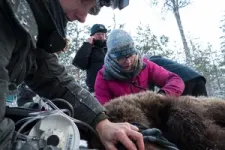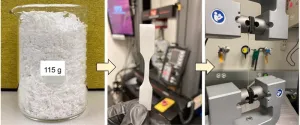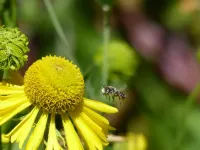(Press-News.org) “Don’t poke the bear”, they said. But that’s exactly what a team of scientists have been doing, to discover the secrets of blood clotting.
Hibernating bears, paralysed humans, and pigs kept in small enclosures all avoid dangerous blood clots, despite being immobile for extremely long periods.
Research from the University of Reading, with partners in Denmark, Germany, Norway and Sweden, shows that reduction of a key protein prevents the formation of blood clots in all three mammal species when they are still for days, weeks, months, or even years at a time. The study is published today (13 April 2023), in Science.
If you’ve ever taken a long haul flight, you might have taken advice to prevent a dangerous blood clot – deep vein thrombosis – from forming in one or both of your legs, while you sit still for multiple hours, dreaming of your destination. Perhaps you set a reminder to get up and walk around, and you wore compression socks to keep the blood from pooling in your legs.
Most people won’t experience a clot if they take care on a flight, but there is a serious risk for some people who are pre-disposed to blood clots, due to genetic factors.
The discovery that a protein known as Hsp47 is dramatically reduced, by 55 times, when someone is immobilised for a much longer period than a flight, could lead to new medicines to help those who have inherited blood clotting disorders that put them at risk for pulmonary embolism, heart attack, and stroke.
Professor Jon Gibbins led the work at the University of Reading. He said: “It seems counterintuitive that people who have severe paralysis don’t appear to be at higher risk of blood clots. This tells us that something interesting is happening. And it turns out that reducing levels of Hsp47 plays a key role in preventing clots, not just in humans, but in other mammals, including bears and pigs.
“When we see something like this in multiple species, that reinforces its importance. Having Hsp47 must have been an evolutionary advantage.”
Hsp47 is released by platelets – the sticky blood cells that trigger blood clotting. Usually clotting is an important response to an injury, to prevent blood loss, and Hsp47 is one of the necessary ingredients to enable platelets to do their job. Examining the role of Hsp47 in clotting function the team found that when released into the blood of bears, mice and humans that it promoted conditions that may give rise to deep vein thrombosis.
Professor Gibbins said “We aren’t totally sure how, but it appears that there is something about movement that keeps Hsp47 at an appropriate level. It could be that the mechanical forces involved in moving around actually have an impact on gene expression, dramatically increasing the amount of Hsp47 that circulates in the blood.”
The team took blood samples from bears in winter, while hibernating, and in summer, while awake and moving around. They also compared people who were immobilised with those who can move and walk. And finally, pigs kept in small pens were compared with others that were free to move around in barns. In all three cases, proteomics experiments showed that the absence of movement was associated with having far less Hsp47.
Professor Gibbins said: “Now we know that Hsp47 is so important, we can begin to look for new or existing medicines that might be able to inhibit the function of this protein in blood clotting and protect mobile people who are prone to clots.”
END
Humans, and piglets, and bears, oh my! Preventing dangerous blood clots
“Don’t poke the bear”, they said. But that’s exactly what a team of scientists have been doing, to discover the secrets of blood clotting.
2023-04-13
ELSE PRESS RELEASES FROM THIS DATE:
UTSA astrophysicist leads international team in discovery of new exoplanet outside Earth’s solar system
2023-04-13
(SAN ANTONIO) April 13, 2023 - An international research team led by UTSA Associate Professor of Astrophysics Thayne Currie has made a breakthrough in accelerating the search for new planets.
In a paper slated for publication April 14 in Science, Currie reports the first exoplanet jointly discovered through direct imaging and precision astrometry, a new indirect method that identifies a planet by measuring the position of the star it orbits. Data from the Subaru Telescope in Hawai`i and space telescopes from the European Space Agency (ESA) were integral to the team’s discovery.
An ...
Shift to ‘flash droughts’ as climate warms
2023-04-13
Embargoed: Not for Release Until 19:00 (7.00 pm) British Summer Time, Thursday, 13 April 2023
Shift to ‘flash droughts’ as climate warms
‘Flash droughts’ have become more frequent due to human-caused climate change and this trend is predicted to accelerate in a warmer future, according to research published today [13 April 2023] involving the University of Southampton.
The research published in Science shows that flash droughts, which start and develop rapidly, are becoming ‘the new normal’ for droughts, making forecasting and preparing for their impact more difficult.
Flash ...
First Nations populations at greater risk of severe flu, research finds
2023-04-13
First Nations populations at greater risk of severe flu, research finds
Responsible for over 5 million infections and 100,000 deaths every year, influenza remains one of the most challenging public health issues for populations globally, particularly First Nations communities.
New research from the Peter Doherty Institute for Infection and Immunity (Doherty Institute) has found that First Nations populations around the world are significantly more likely to be hospitalised and die from influenza compared to non-Indigenous populations.
Researchers from the Doherty ...
Channeling mechanical energy in a preferred direction
2023-04-13
A research group led by scientists from the RIKEN Center for Emergent Matter Science have developed a unique material, based on nanofillers embedded in a hydrogel, that can channel mechanical energy in one direction but not the other, acting in a “nonreciprocal” way. With this composite material--which can be constructed at various sizes--the team was able to use vibrational up-and-down movements to make liquid droplets rise within a material against gravity. Using this material could thus make it possible to make use of random vibrations and move matter in a preferred direction.
Channeling energy in a preferred direction is an ...
Chemists redesign biological PHAs, ‘dream’ biodegradable plastics
2023-04-13
They’ve been called “dream” plastics: polyhydroxyalkanoates, or PHAs. Already the basis of a fledgling industry, they’re a class of polymers naturally created by living microorganisms, or synthetically produced from biorenewable feedstocks. They’re biodegradable in the ambient environment, including oceans and soil.
But there’s a reason PHAs haven’t taken off as a sustainable, environmentally benign alternative to traditional plastics. Crystalline PHAs are brittle, so not as durable and convenient as conventional plastics. They cannot easily be melt-processed and recycled, making them expensive to produce.
Colorado State ...
Bees flock to clearcut areas but numbers decline as forest canopy regrows, OSU research shows
2023-04-13
CORVALLIS, Ore. – Native bees in the Oregon Coast Range are diverse and abundant in clearcut areas within a few years of timber harvest but their numbers drop sharply as planted trees grow and the forest canopy closes, research by Oregon State University shows.
The findings are important for understanding the roles forest management might play in the conservation of a crucial pollinator group, the researchers said.
The study, led by graduate student Rachel Zitomer and Jim Rivers, an animal ecologist in the OSU College of Forestry, was published in Ecological Applications.
“The research demonstrates ...
Global study finds some women experience heavier menstrual flow after COVID-19 vaccination
2023-04-13
A new international study finds that women vaccinated for COVID-19 have a slightly higher risk for a heavier period after vaccination.
The study, led by Oregon Health & Science University reproductive health services researcher Blair Darney, Ph.D., M.P.H., and physician-scientist Alison Edelman, M.D., M.P.H., published today in the British Journal of Obstetrics and Gynaecology. These findings build on prior work from the same research team that first identified an association between COVID-19 vaccines ...
Virtual fitting rooms can be a double-edged sword
2023-04-13
AMES, IA – Driven by online shopping, a growing number of retailers have launched virtual fitting rooms in recent years. That includes Amazon, the top apparel seller in the U.S., along with Nike, Macy’s and Walmart. The virtual rooms allow shoppers to ‘try on’ clothes through interactive simulation technology and texture-mapped product images. It can cut down on returns and nudge hesitant shoppers to click the checkout button.
But findings from a recently published study indicate virtual fitting rooms could backfire on retailers if they assume ...
Low-professionalism residents later draw higher patient complaints: Study
2023-04-13
The first study to examine evaluation scores for professionalism and interpersonal communication skills among physicians-in-training and what happens afterward as these doctors begin their practice is reported in JAMA Network Open. The study tracked 9,340 early-career physicians from across the country.
The study finds a strong association between lower ratings for these competencies among residents in their last year of training and greater likelihood of unsolicited patient complaints among doctors during their first year of employment ...
Journal of Neuromuscular Diseases transitioning to Gold Open Access in 2023
2023-04-13
Amsterdam, April 13, 2023 – The Journal of Neuromuscular Diseases (JND), published by IOS Press, is pleased to announce that from July 1, 2023 (Volume 10, Issue 4), the journal will transition to a Gold Open Access publication. This means that all articles published after that date will be immediately and permanently freely available online for readers to view, download, share, and reuse, and will enable authors to more easily comply with funder and institutional mandates.
“When JND launched almost 10 years ago, among our primary goals was and continues to ...
LAST 30 PRESS RELEASES:
SfN announces Early Career Policy Ambassadors Class of 2026
Spiritual practices strongly associated with reduced risk for hazardous alcohol and drug use
Novel vaccine protects against C. diff disease and recurrence
An “electrical” circadian clock balances growth between shoots and roots
Largest study of rare skin cancer in Mexican patients shows its more complex than previously thought
Colonists dredged away Sydney’s natural oyster reefs. Now science knows how best to restore them.
Joint and independent associations of gestational diabetes and depression with childhood obesity
Spirituality and harmful or hazardous alcohol and other drug use
New plastic material could solve energy storage challenge, researchers report
Mapping protein production in brain cells yields new insights for brain disease
Exposing a hidden anchor for HIV replication
Can Europe be climate-neutral by 2050? New monitor tracks the pace of the energy transition
Major heart attack study reveals ‘survival paradox’: Frail men at higher risk of death than women despite better treatment
Medicare patients get different stroke care depending on plan, analysis reveals
Polyploidy-induced senescence may drive aging, tissue repair, and cancer risk
Study shows that treating patients with lifestyle medicine may help reduce clinician burnout
Experimental and numerical framework for acoustic streaming prediction in mid-air phased arrays
Ancestral motif enables broad DNA binding by NIN, a master regulator of rhizobial symbiosis
Macrophage immune cells need constant reminders to retain memories of prior infections
Ultra-endurance running may accelerate aging and breakdown of red blood cells
Ancient mind-body practice proven to lower blood pressure in clinical trial
SwRI to create advanced Product Lifecycle Management system for the Air Force
Natural selection operates on multiple levels, comprehensive review of scientific studies shows
Developing a national research program on liquid metals for fusion
AI-powered ECG could help guide lifelong heart monitoring for patients with repaired tetralogy of fallot
Global shark bites return to average in 2025, with a smaller proportion in the United States
Millions are unaware of heart risks that don’t start in the heart
What freezing plants in blocks of ice can tell us about the future of Svalbard’s plant communities
A new vascularized tissueoid-on-a-chip model for liver regeneration and transplant rejection
Augmented reality menus may help restaurants attract more customers, improve brand perceptions
[Press-News.org] Humans, and piglets, and bears, oh my! Preventing dangerous blood clots“Don’t poke the bear”, they said. But that’s exactly what a team of scientists have been doing, to discover the secrets of blood clotting.







